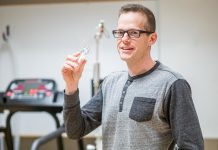Pittsburgh, April 2003 � According to a study presented by University of Pittsburgh Medical Center (UPMC) researchers at the American Surgical Association�s (ASA) 123rd annual meeting in Washington, D.C., 97 percent of patients who underwent laparoscopic Roux-en Y gastric bypass surgery for obesity (LGBP) had resolution or improvement of their type 2 diabetes mellitus.
The study by Philip Schauer, M.D., assistant professor of medicine at the University of Pittsburgh School of Medicine and co-director of the Minimally Invasive Surgery Center at UPMC Presbyterian Hospital, examined 1,150 patients over a five-year period following their LGBP surgeries. Of those patients in the study, 240 (21 percent) had type 2 diabetes mellitus and 192 of the 240 patients (80 percent) were available for follow-up.
The LGBP procedure involves constructing a small stomach pouch of approximately 15 millimeters (about the size of a plastic medicine cup), and bypassing a small segment of intestines by constructing a Y-shaped limb of small bowel. Patients lose weight because there is a decrease in caloric intake resulting from the reduced reservoir capacity of the small stomach pouch.
Type 2 diabetes is the most common form of diabetes, in which the body is unable to properly use the insulin that it produces. About 80 percent of people with type 2 diabetes are overweight.
Study participants included 144 females (75 percent) and 48 males with a mean age of 48 (range 26-67). The mean preoperative weight and body mass index (BMI), was 308 pounds and 50.1 respectively, and the mean postoperative weight was 211 pounds and 34 BMI for a mean weight loss of 97 pounds and mean excess weight loss of 60 percent. The mean hospital stay was 3.3 days with a major morbidity of 5 percent and mortality of 0.4 percent.
Continue Reading Below ↓↓↓
In the study, diabetes resolved after an average of 62 days following surgery. In 199 patients that had diabetes for less than five years, diabetes resolved in 46 days. In 29 patients with diabetes for more than 10 years, the diabetes resolved in 98 days. No patients had progression of their diabetes to a more severe form after surgery.
"Patients with the shortest duration and mildest form of diabetes prior to surgery had quicker resolution and significantly better outcomes, suggesting that early surgical intervention is warranted to increase the likelihood of patients having a normal level of glucose in the blood,� said Dr. Schauer.
The ASA was founded in 1880 and is the nation�s oldest and most prestigious surgical organization. Membership includes leading surgeons from around the world. The primary mission of the ASA is to provide a national forum for presenting the developing state of the art and science of surgery and the elevation of the standards of the medical/surgical profession.
Source: University of Pittsburgh Medical Center









